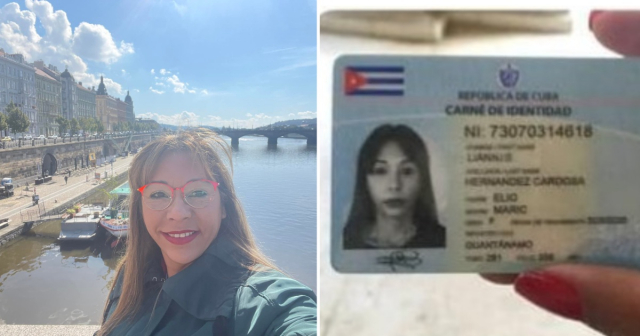The Supreme Court of Cuba denied access to justice for the activist and independent reporterIliana Hernandez after rejecting for the third time hislawsuit against the Ministry of the Interior due to the immigration regularization that has prevented him from leaving the national territory since March 2018.
"I knew this was going to happen from the first moment I hired my lawyer," Hernández toldCyberCubathrough a phone call.
The activist pointed out that her legal representative felt totally disappointed, because she never thought that a request of this type and with such unsustainable arguments would be denied.
"The only thing left is to demonstrate the complicity of justice with the regime, which uses women to invalidate my freedom of movement," Hernández said.
After hearing the news, the activist announced on Twitter that she would continue her efforts, now in international courts.
"Once all internal means have been exhausted, I will go to international ones, they violate my freedom of movement for opposing the Communist Party of Cuba," he wrote.
Ricardo Cabrales, the independent reporter's lawyer, gave us access to the documents that she presented before the Cuban justice system in different instances for three years and that show the manipulation of Cuban laws to support the immigration regularization of Iliana Hernández.
The first document was delivered to the Provincial Court of Havana in October 2019, and is a lawsuit in administrative proceedings against the Ministry of the Interior regarding the decision to prevent Hernández from leaving the national territory.
It mentions that in March 2018 the activist was notified, without further explanation, that she could not travel to the United States.
Subsequently, the Procedures Office of the Directorate of Identification, Immigration and Foreigners verbally reported that it was “regulated” for reasons of public interest.
After presenting an appeal to the head of the Directorate of Identification, Immigration and Immigration, which was not resolved in time, Hernández appeared before the Minister of the Interior, where his claim was denied through administrative silence.
Without further administrative resources available, Hernández resorted to jurisdictional proceedings in October 2019, protected by the Constitution of the Republic, the Universal Declaration of Human Rights, the Law of Civil, Administrative, Labor and Economic Procedure, the Migration Law, the Civil Code and Instruction No. 245 of the Governing Council of the Supreme People's Court.
The Popular Provincial Court of Havana rejected Hernández's claim in January 2020 because "the law that develops such constitutional precept has not yet been enacted."
In February of that year, the legal representative of the activist presented an appeal before the Supreme People's Court, where he recalled that the lawsuit was filed under article 674 of the Law of Civil, Administrative, Labor and Economic Procedure, and not of the article 99 of the Constitution.
"It cannot be understood, in any way, that article 99 of the Constitution is not in full force, that as long as the parliamentary body does not approve its development law, citizens cannot access judicial means to claim their rights, much less , as the Court wrongly reasons," stated the appeal.
Likewise, an extension of the appeal was presented, presenting a total of five grounds of challenge to demonstrate that the rights of the Cuban activist are violated.
The Supreme Court decided to dismiss the appeal in May 2021 and explicitly recognized that it was rejecting the appeal filed “despite having different protections.”
In August of this year, Hernández's lawyer presented a review process in which it is also argued that none of the reasons alleged up to that point were examined, even briefly.
"Nor does the judicial body explain why it does not reason, contrary to the legal mandate, on these five alleged grounds for cassation," the lawyer said.
Likewise, a new argument was presented, different and unrelated to the one previously considered by the Court to dismiss the lawsuit, which placed the independent reporter "in a state of defenselessness, with transcendence to the right she claims."
For the judges, Hernández complied with the decision of the Immigration and Immigration Directorate when he told her, verbally, that she could not travel abroad because she was “regulated” for reasons of public interest and did not initiate a challenge process aimed at obtaining modification or rectification of the measure.
"That is, the Court considers the complaint out of time (...), in accordance with the 1976 constitutional text, when the wording of the now repealed article 63 established that 'every citizen has the right to address complaints and petitions to the authorities and to receive the attention or pertinent responses and within an adequate period, in accordance with the law', without specifying, nor does any other lower-ranking norm, a period for the exercise of this right by citizens. The Court does not clarify which one. was the deadline that Ms. Hernández Cardosa failed to comply with," the appeal says.
After presenting other arguments, the Supreme People's Court issues this new ruling in which the process established by Hernández is declared inadmissible and closing all doors to finding a legal solution in national territory.
The Ministry of the Interior regulates Cuban citizens and prevents them from entering or leaving the country based on the provisions of Decree Law 302/2012, in which Law 1213/1976 was modified and established the limitations by which the Cuban State can prevent a person from carrying out any of these activities.
The number of Cubans regulated by the Cuban immigration authorities exceeds 247, according to unofficial data compiled by the Patmos Institute.
In October 2010, a journalist from the EFE news agency asked Cuban Foreign Minister Bruno Rodríguez Parrilla about the situation these citizens are experiencing, to which the official responded:"I don't know, we would have to know case by case".
What do you think?
SEE COMMENTS (1)Filed in:
